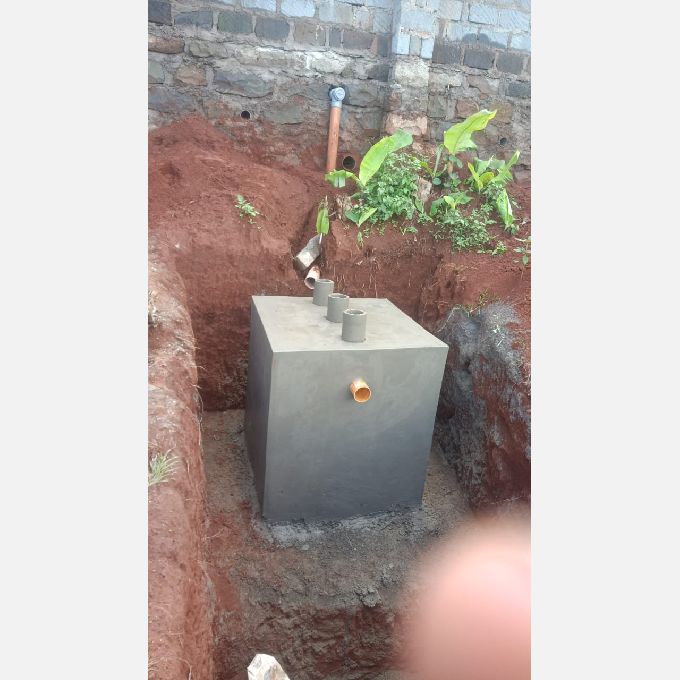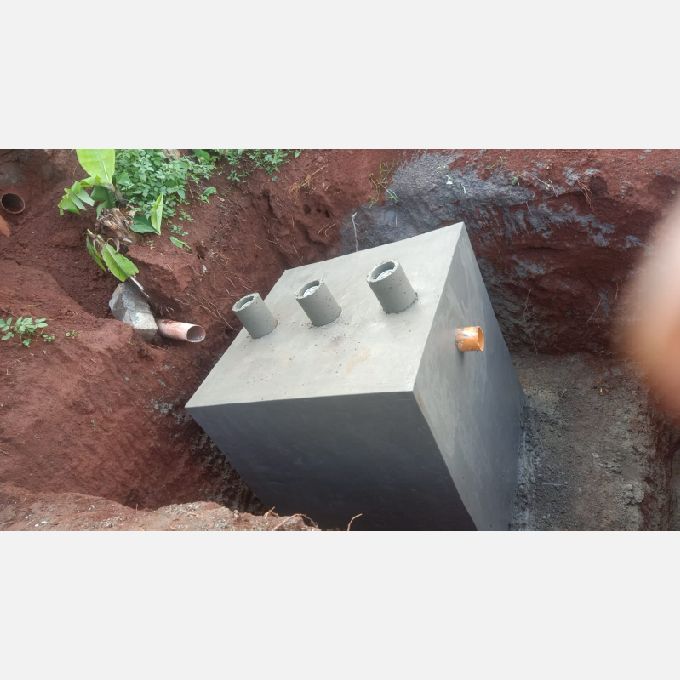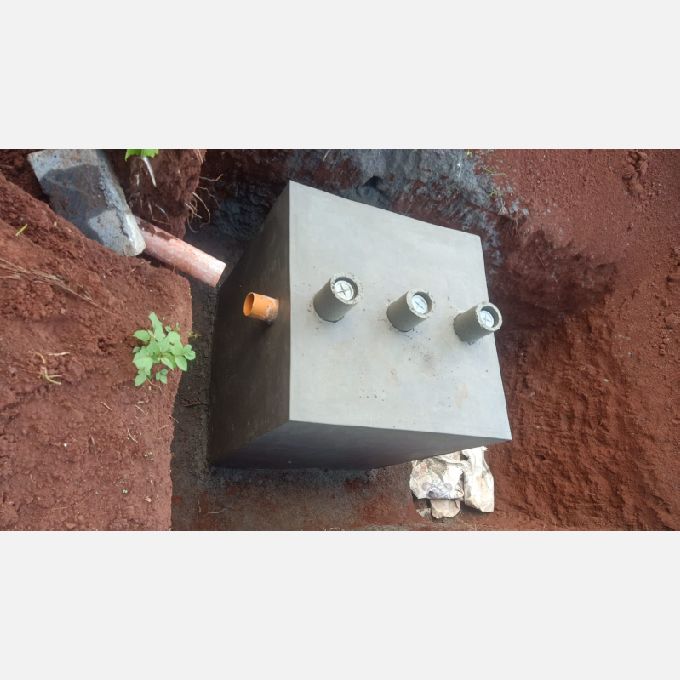A client approached us with a need to install a biodigester system in their home in Kiambu. The goal was to create an environmentally friendly solution for waste management, while also providing an efficient method for producing biogas for domestic use. With an increasing focus on sustainability and reducing reliance on traditional waste disposal methods, the client recognized the value of a biodigester system to treat organic waste on-site. We took on the task with dedication, bringing in our expertise in the installation of biodigester systems. The first step involved assessing the site and determining the most suitable location for the installation, taking into account factors such as space, accessibility, and waste disposal needs. Our team carefully designed a system that would fit the client’s home while maximizing the efficiency and output of the biodigester. Once the design was finalized, we sourced the necessary materials and commenced the installation. The process involved digging, setting up the biodigester unit, and connecting it to the home's existing waste disposal systems. We ensured that the system was properly sealed and installed, with thorough testing to guarantee its functionality. By the end of the project, the client had a fully operational biodigester, ready to manage waste and produce biogas. The project was completed on time and within budget, and the client was extremely satisfied with the final result. If you need skilled biodigester installation expert to assist with your setup, reach out to us. This installation marks a step toward more sustainable and eco-friendly waste management practices, benefiting both your home and the environment.
What Are the Key Benefits of Installing a Biodigester at Home?
Biodigesters offer homeowners a range of benefits beyond waste disposal, helping to turn organic materials into valuable byproducts. They are a sustainable, efficient, and eco-friendly solution for households that want to manage waste more responsibly. Below are some of the primary advantages of installing a biodigester in a home.
- Waste Reduction: A biodigester significantly reduces the volume of organic waste produced by households. Instead of sending food scraps, garden trimmings, and other organic matter to landfills, the biodigester breaks them down naturally. This reduces the environmental burden of waste management, cutting down on landfill overflow and lowering the amount of waste sent to incinerators. The conversion of waste into useful byproducts also eliminates the need for manual sorting of waste, making disposal more efficient.
- Improved Soil Fertility: After the organic material undergoes the anaerobic digestion process, the remaining solid waste transforms into nutrient-rich compost. This compost can be used as a natural fertilizer to enhance soil fertility in gardens, yards, or farms. It enriches the soil by adding essential nutrients such as nitrogen, phosphorus, and potassium, helping plants thrive without the need for harmful chemical fertilizers. Using this compost also supports sustainable gardening practices, reducing dependency on synthetic products that can harm the environment.
- Cost Savings: Although the initial cost of installing a biodigester may be a consideration for some homeowners, the long-term savings are substantial. Homeowners can save money on waste collection fees, as the need for external waste management services is reduced. Additionally, the compost generated can replace expensive chemical fertilizers, further decreasing overall gardening and farming costs. In the long run, these savings can significantly offset the initial investment, making biodigesters an economically viable solution for many households.
- Sustainability and Environmental Benefits: Biodigesters contribute to a more sustainable lifestyle by providing an eco-friendly waste disposal method. Rather than relying on traditional methods like burning waste or sending it to landfills, a biodigester helps reduce greenhouse gas emissions and prevent pollution. The system's closed-loop process makes it an environmentally conscious option that supports a circular economy, where waste is reused to produce valuable products. This sustainable approach to waste management can help homeowners reduce their carbon footprint and contribute positively to the environment.
Installing a biodigester in a home brings numerous advantages, from reducing waste and creating nutrient-rich compost to offering cost savings and contributing to sustainability efforts. With the ability to turn organic waste into something valuable, a biodigester provides both immediate and long-term benefits. It offers an effective and environmentally friendly way for homeowners to manage their waste while promoting better gardening and farming practices. For those looking to make a lasting impact on their household's waste management practices, a biodigester is a wise investment.
What Should Homeowners Consider Before Installing a Biodigester?
Before committing to the installation of a biodigester, homeowners should carefully assess several important factors to ensure the system will work effectively and meet their needs. Here are the key considerations:
- Space Availability: Biodigesters need sufficient space for both installation and ongoing maintenance. Homeowners must ensure they have enough room in their yards or property to accommodate the system, which is typically installed underground. The size of the biodigester will depend on the household's waste generation and the amount of space available. Adequate space is also essential for future access for system checks and maintenance.
- Waste Generation: A biodigester is most efficient when it is regularly fed with organic waste. Homeowners should consider their household’s waste production, as the system’s capacity should match the amount of waste generated. Larger households with substantial organic waste will benefit from a larger system, while smaller homes may need a smaller installation or alternative ways to increase waste flow. The biodigester relies on consistent waste input to function optimally, ensuring efficient decomposition.
- Water Supply: Water is an integral part of the biodigestion process. For the system to function efficiently, homeowners must have a reliable and consistent water supply. This is particularly important in areas with inconsistent water availability. Without proper water access, the anaerobic digestion process can slow down or even fail, impacting the overall functionality of the biodigester.
- Maintenance Requirements: Though biodigesters are relatively low-maintenance, homeowners should still expect some periodic maintenance. This includes monitoring the waste breakdown process, checking for leaks or blockages, and ensuring that the system is operating smoothly. Regular cleaning and monitoring are essential to prevent malfunctions and ensure efficient waste processing. Homeowners should also be prepared for occasional repairs or replacements of parts, such as the inlet or outlet pipes, to maintain proper functioning.
- Cost of Installation: While the initial installation of a biodigester can be costly, it is an investment that can lead to long-term savings. Homeowners should evaluate the upfront costs, which vary depending on the size and complexity of the system, against the potential savings from waste management and improved soil fertility. It’s also essential to consider long-term maintenance costs, as these can be minimal compared to the costs of other waste disposal methods.
Installing a biodigester can be an excellent solution for homeowners looking to reduce their waste and benefit from a sustainable waste management system. By considering key factors such as available space, waste generation, water supply, maintenance, installation costs, and local regulations, homeowners can make an informed decision about whether a biodigester is right for them. With proper planning and professional installation, a biodigester can help create a cleaner, more sustainable living environment by turning organic waste into valuable compost while reducing the environmental impact of household waste.
Our Biodigester Installation Process for Residential Homes
Installing a biodigester in a residential home is an effective way to manage organic waste sustainably while producing valuable compost for gardening and landscaping. Our process ensures that each system is designed to meet the specific needs of the household while providing long-term benefits. Here is an overview of the key steps we follow during installation.
- Site Assessment and Consultation: The first step in our installation process is conducting a comprehensive site assessment. We visit the location to evaluate the available space, waste production levels, and soil quality. This helps us determine the most suitable biodigester size and design for your home. During this consultation, we discuss your specific needs and expectations, ensuring that the biodigester will be both effective and efficient.
- System Design and Sizing: After assessing your site, we move on to designing a customized biodigester system. The size and capacity of the system will depend on the amount of organic waste your household generates. We ensure that the design meets your home’s unique requirements while maximizing the system’s efficiency. A properly sized biodigester ensures optimal waste breakdown and the production of high-quality compost for your garden.
- Excavation and Preparation: Once the system design is approved, we prepare the installation site by excavating the ground. The excavation process ensures that the biodigester is installed securely and at the right depth to optimize waste processing. We ensure that the system is positioned correctly to allow for easy access during maintenance and provide the best possible waste treatment.
- Installation of the Biodigester: Next, we proceed with the installation of the biodigester. This involves placing the system in the prepared excavation and connecting all necessary components, including the inlet for organic waste and the outlet for compost. We ensure that all pipes and vents are properly sealed and tested to prevent any leaks. During installation, we also focus on ease of maintenance and durability, ensuring the system will function smoothly for years to come.
- Testing and Quality Control: After installation, the biodigester is thoroughly tested to ensure that it is functioning as expected. We check that the waste breaks down efficiently, and the system produces quality compost. Our team makes any necessary adjustments and provides you with guidelines for the optimal use and maintenance of your biodigester. We also ensure that all components are properly sealed to prevent odors or contamination.
- User Training and Support: Once the biodigester is up and running, we offer training to homeowners on how to operate and maintain the system. Our team ensures that you understand how to add waste, monitor the system, and harvest the compost. We also offer ongoing support and advice to help you make the most of your biodigester. Regular maintenance and care will ensure your system continues to provide compost efficiently over time.
Our biodigester installation process is designed to be seamless and efficient, allowing homeowners to manage their organic waste in a sustainable manner. The system’s ability to turn waste into high-quality compost not only reduces the amount of waste sent to landfills but also helps in improving soil health. By investing in a biodigester, you’re contributing to a greener planet while reaping the benefits of reduced waste disposal costs, improved soil fertility, and eco-friendly waste management. If you're looking for a reliable, long-term solution for waste disposal at home, our professional biodigester installation services will be a valuable asset to both your household and the environment








